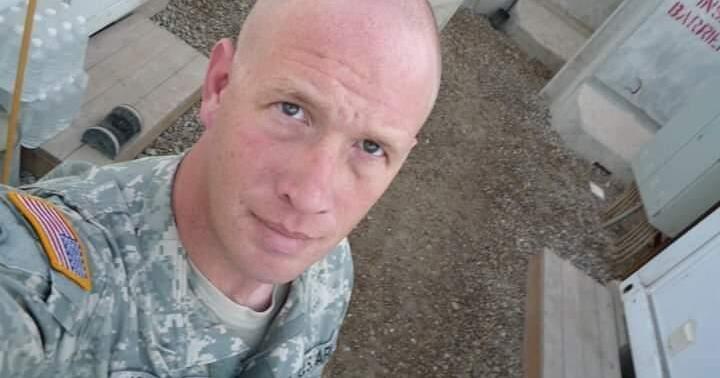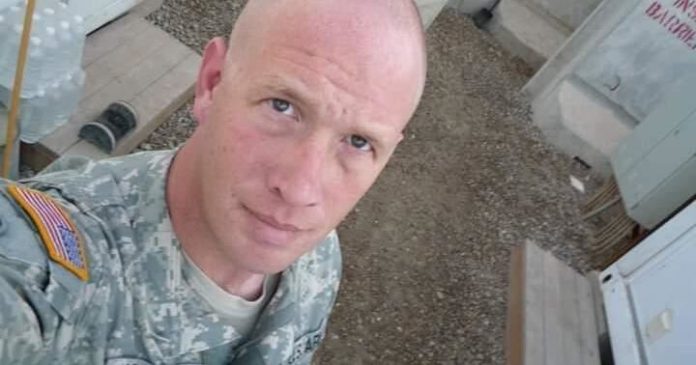
COPPERAS COVE — When retired U.S. Army Staff Sgt. Jim Johnsen first joined the military, being openly gay or lesbian was cause for not only harassment or worse, but also grounds for dismissal from the service.
“I had friends who knew I was gay, but you weren’t just out and free about it because you could be ridiculed (and) you could be kicked out,” the 50-year-old Copperas Cove resident said earlier this month. “For me, the hardest part was having my two lives merged together into one.”
Johnsen was born in Boone, Iowa, and joined the Army after graduating from high school in 1990 in Eddyville, about 70 miles southeast of Des Moines. He signed up for a two-year hitch, mostly for the education benefits so he could go to college.
When he arrived at Fort Leonard Wood, Mo., for basic training, it did not take long before he began to wonder about his decision-making.
“At the time, they had the two-year program to where you could serve for two years, get some college money, and go to school,” he said. “You’re just a kid and you don’t know anything about the Army, so, hey, that sounds pretty good.
“Then you get there, and you don’t know what you signed up for.”
AIT (advanced individual training) was also at Fort Leonard Wood, and then it was off to Germany, where Johnsen served as a combat engineer and tracked vehicle crewman. A short time later, he was deployed to Iraq for Operation Desert Shield/Desert Storm.
“Yeah, that was a little tough,” he said. “I was in Germany for Thanksgiving but right after Thanksgiving, I was deployed, so my first Christmas away from home, I was in a war zone. I’d never been away from home and here I am in a foreign country for Christmas, not knowing what the hell to do.”
Fortunately for him, Johnsen was assigned to what he calls “probably the best unit” of his 23-year career, and fellow soldiers and his leaders helped him and other young troops get through the tough times early in that six-month deployment.
“You gravitate toward people who have the experience — the guys you work with who have been deployed and been through it before. They tell you, ‘Relax. We got you. It’s not that bad.’
“My commanders — my first sergeant — they really looked out for the troops. They made us all feel like family. We were a company and we felt like a family. We may have been a disgruntled family, or a disorganized family, but we were family. We could have our disagreements, but we had each other’s back. You know, he’s my brother (and) I will whip his ass if he’s being stupid, but I will whip your ass if you mess with him.”
After Iraq, Johnsen came back to Fort Stewart, Ga., to finish his two-year commitment, then went home to Iowa and enrolled in community college to study computer programming, and also served in the Army Reserve.
His plan was to become a programmer, like several other family members, but he soon figured out he did not much enjoy coding, software and such, so he went to work for a couple of years instead of going to school, considered his options, and decided to re-join the military full-time.
“I hit tough times and I just decided I had it easier in the Army,” Johnsen said. “I got to travel the world; I always had a roof over my head; never had to worry where my next meal was coming from. So I went back, became a mechanic, went to Maryland for training in January ’97. Then went to Fort Bragg, and no, I did not jump out of airplanes.
“At first, I thought, ‘I want to do something I would never (ordinarily) do, and that was one of those things. But then while in training, I was like, ‘No, I don’t want to do that.’”
He deployed to Iraq again, followed by an extended tour in Germany, then another Middle East deployment in 2003; then was assigned to Fort Hood in November 2006, where he stayed until retirement in 2013 following another 15-month deployment.
It was during that second go-round on active duty that Johnsen started to experience problems due to his sexuality.
“There were times when people (who suspected) tried to create issues. There were people assuming, and of course I had to play it off. Since there was no hard evidence, then they just ended up separating people, or the issues, or whatever. When that sort of thing happened, they moved people around and the problem just kind of went away.”
In 1982, the military enacted a policy explicitly banning gay men and lesbians. Before that, same-sex relations were criminalized and cause for discharge. In 1994, the famous “don’t ask, don’t tell” policy was adopted, which allowed LGBTQ (lesbian, gay, bisexual, transgender, queer) people to serve, as long as they did not disclose their sexual orientation.
Eighteen years later, in 2011, that policy was repealed by Congress, and openly gay, lesbian and bisexuals were allowed to serve in the U.S. military.
Even so, Johnsen and others like him kept their sexuality hidden, fearing that being exposed would threaten their careers.
“The younger soldiers were all running around, throwing rainbows all over their cars — ‘We’re here (and) we’re queer; get used to it’ — and I’m thinking, ‘Uh-uh. They’re going to swoop you up and get you out.’
“I didn’t believe the hype, and still to this day, I have my times when I’ll celebrate myself at Pride events or whatever, but what I’ve learned through being in the military … you don’t make yourself a target. I don’t want to bring attention to myself.
“I was never openly gay in the military, and, honestly, I’ve not been able to really do that (fully come out) until, I would say, the last two months.”
Along with other concerns, one reason for continuing to maintain a low profile was his involvement with Mount Hiram Masonic Lodge no. 595 in Copperas Cove. Until a couple of weeks ago, Johnsen served as the 102nd man selected to a one-year term as leader, or “Worshipful Master,” of the lodge that was organized in the late 1880s.
After he also became a board member of the Central Texas Pride Community Center, a group created to promote greater awareness of LGBTQIA+ issues (lesbian, gay, bisexual, transgender, queer or questioning, intersex, asexual) and “to provide openness and safety to our queer family,” word spread and more people began to learn the truth. That was fine with him, Johnsen says, although he still does not like to draw attention to himself in that way.
“Some people are willing to accept it, but there’s still so many out there who are unaccepting.
“Since I was in charge of the Masonic lodge for the past year, some are finding out about the other side of my life, if you will, and some of them are, like, ‘That’s a big surprise.’
“And I’m, like, ‘What difference does it make? I’m still the same person.’
“I don’t let people with small minds know everything about my life because I don’t need to be ridiculed or thought less than. I’m the same person. What I do inside my house is my business. As far as my dedication to my community (and) what I bring to the table to try and help make it a better place, it doesn’t matter anything about me personally.
“I am who I am, and my dear friends who know me and know me well, know that it’s not something I try and shove down someone’s throat. I try to be, like, this is who I am, and if you like me, great. I’m not going to change who I am to try to be liked by you or anyone else.”
When he reported to boot camp 32 years ago, Johnsen, a pharmacy technician who along with his community service endeavors also enjoys traveling and playing the occasional round of golf, may have questioned whether he had made the right decision, but looking back at it now, he says he has no regrets about anything.
“Absolutely not,” he said. “I believe everything happens for a reason, and I believe that I wouldn’t be the person I am today without facing those obstacles that I have faced. Joining the military and all the experiences — no matter how good or bad I thought them to be at the time — have made me a stronger individual.
“I try not to have any regrets. I look at many things as a learning experience, and you have to go through these things to learn things.”







